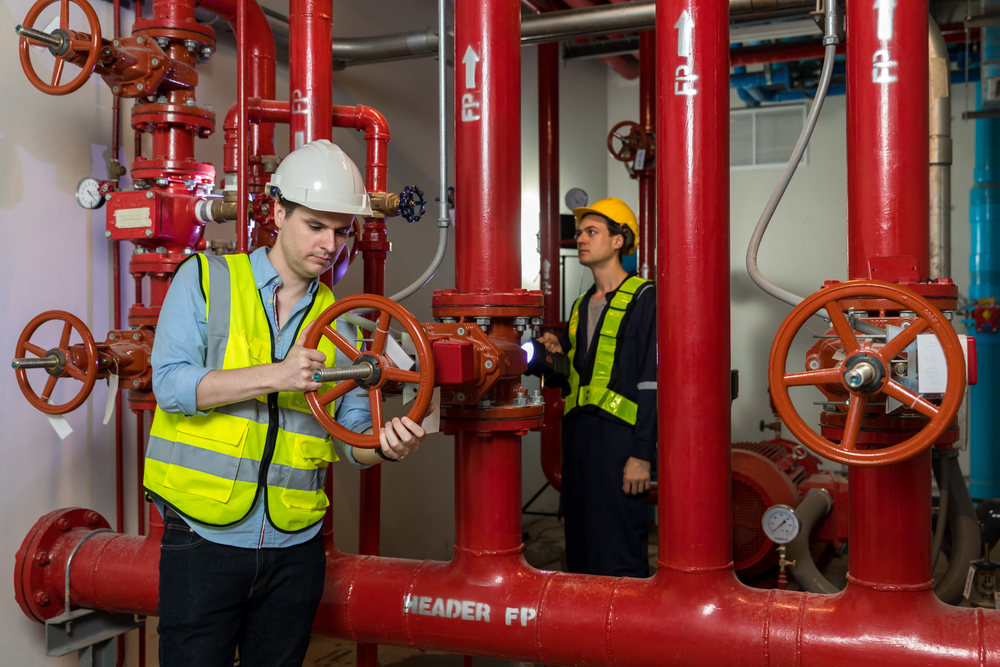 27
Nov
27
Nov
Fire Suppression System Inspection: What Every Business Owner Should Know
- 0 Comment(s)
- November 27, 2024
Operating a business involves numerous responsibilities, from leading a team and driving sales to managing operations and addressing tax requirements. Among these, one critical task that should never be deferred is the fire suppression system inspection. This key maintenance not only guarantees compliance but also safeguards your premises, employees, and clients.
The Importance of Fire Suppression System Inspections
Fire suppression systems play a key role in workplace safety. Whether it’s a sprinkler system, gas suppression unit, or kitchen fire equipment, these systems must undergo routine inspections to make sure they are fully operational. Regular maintenance guarantees that in the event of a fire, your equipment will respond effectively, preventing potential disasters.
What Happens During a Fire Suppression System Inspection?
Contrary to common assumptions, inspections are comprehensive processes that go far beyond a simple visual check. Qualified fire safety professionals meticulously assess all components of the system. This includes testing alarms, checking valve integrity, inspecting for leaks, verifying the levels of extinguishing agents, and confirming that all components are clean and operational.
Technicians also evaluate the power supply, examine control panels for faults, and conduct detailed testing to make sure all elements function cohesively. Fire suppression systems must operate seamlessly, as there is no room for error during an emergency.
Inspection Frequency: Not a Once-and-Done Deal
The frequency of inspections depends on the specific system in use. Some systems require semi-annual inspections, while others may only need annual evaluations. Businesses with high fire risks, such as restaurants, often require even more frequent attention for their kitchen suppression systems.
Compliance with government regulations is another significant factor. Many jurisdictions mandate keeping detailed inspection records, making it key to schedule routine checks to stay in line with legal requirements.
The Cost of Skipping Inspections
Neglecting fire suppression system inspections can have serious consequences. First, there are financial implications—insurers are unlikely to provide coverage if a fire system has not been maintained. Fines may be imposed, insurance claims could be denied, and businesses may face significant expenses replacing systems that have deteriorated due to neglect.
More critically, skipping inspections puts safety at risk. Fires can occur unexpectedly, and a malfunctioning system can lead to devastating outcomes. Protecting lives and property requires systems to function correctly when they are needed most. Avoiding inspections is a risk no responsible business should take.
Choosing the Right Professional Inspector
Expertise matters when selecting a professional to inspect fire suppression systems. These systems are complex, requiring trained and certified technicians who understand their intricacies. Certified professionals possess the knowledge needed to evaluate, maintain, and repair these systems, guaranteeing compliance with fire safety regulations.
Additionally, thorough inspections should include documentation, which may prove invaluable during interactions with fire marshals or when filing insurance claims. Choosing qualified inspectors is a vital step in safeguarding a business.
Compliance: An Indispensable Responsibility
Compliance, though not the most engaging topic, is a key aspect of responsible business operations. Adhering to fire codes and safety regulations is mandatory, safeguarding both the business and its stakeholders. Accurate inspection records provide proof of compliance, which can simplify the process of obtaining permits and strengthen the validity of insurance claims.
Beyond regulatory obligations, maintaining compliance underscores a business’s dedication to the safety and well-being of employees and customers. A proactive approach not only reduces risks but also fosters trust and reinforces the company’s reputation as a reliable and conscientious entity in its industry.
The Technology Behind Modern Fire Suppression Systems
Fire suppression systems have advanced significantly, incorporating cutting-edge technologies to improve safety. Modern detection systems are highly sensitive, capable of responding to even minimal smoke or heat. Gas suppression systems, often used to protect valuable equipment, extinguish fires without causing damage to electronics.
Inspecting these sophisticated systems requires specialized knowledge. From advanced detectors to control panels and remote monitoring software, certified technicians must perform detailed evaluations to keep systems operational.
Common Myths
A prevalent misconception is the belief that “It’s never happened before, so it won’t happen now.” The absence of prior incidents, however, does not equate to guaranteed future safety. Fires are inherently unpredictable, and without regular inspections, critical vulnerabilities may go unnoticed. Inspections play a key role in makes sure systems remain functional and ready to respond, whether a fire emergency occurs tomorrow or several years into the future.
Another common fallacy is the assumption that sprinklers alone bring complete fire protection. While effective in many scenarios, sprinklers are not universally suitable, especially for risks like electrical fires where water is not an appropriate suppression medium. Businesses require a more comprehensive approach, incorporating a range of fire suppression tools tailored to different environments and hazards. To maximize their effectiveness, these systems must undergo routine maintenance to verify their operational readiness and suitability for diverse fire risks.
Making Inspections Routine
Making inspections a regular part of your business operations is necessary, similar to routine vehicle maintenance. While inspections might initially seem inconvenient, they provide significant long-term benefits. Many professional inspectors offer flexible scheduling, making it easier to plan visits around your business needs.
By establishing a consistent inspection routine, you can proactively address potential issues before they become emergencies. This practice not only helps maintain the functionality of your fire suppression systems but also offers peace of mind. It eliminates the stress and disruption that can arise during an unexpected crisis.
Get Reliable Fire Suppression System Inspections with Yadkin Fire & Safety
Ready to keep your business safe without the hassle? Yadkin Fire & Safety (YFS) is here to help. For over 20 years, we’ve proudly served our local community in East Bend, NC, and beyond. As a family-owned company with an A+ Better Business Bureau rating, we specialize in high-quality fire extinguisher and fire suppression services.
Our motto is “Quality with No Compromise,” and we mean it. Whether you need inspections, maintenance, or emergency services, our certified team is ready. Contact us today to schedule your fire suppression system inspection and make safety a habit, not a hassle. Call (336) 699-4370 or visit our website to learn more.

